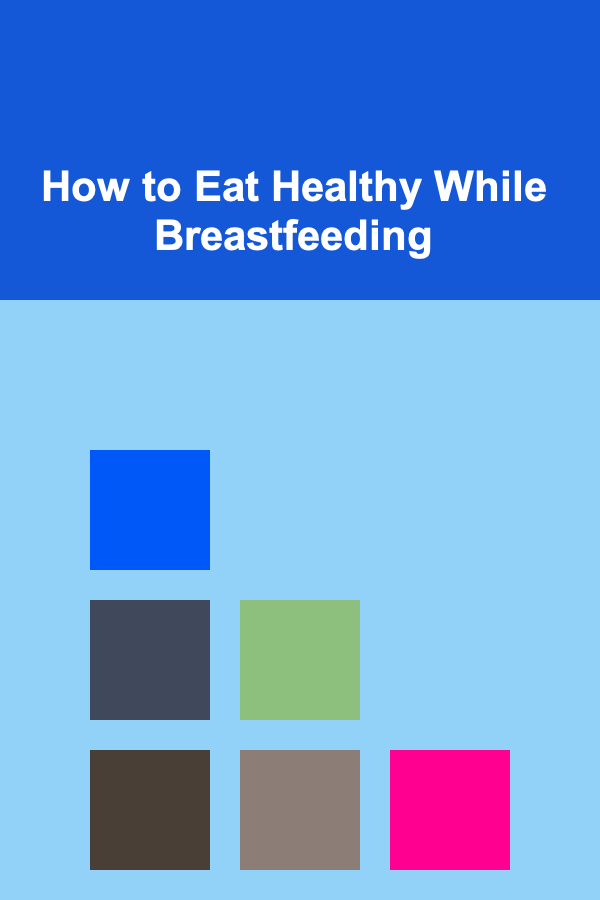
How to Eat Healthy While Breastfeeding
ebook include PDF & Audio bundle (Micro Guide)
$12.99$7.99
Limited Time Offer! Order within the next:

Breastfeeding is one of the most important aspects of motherhood, offering a wide range of benefits for both mother and child. For the mother, breastfeeding not only provides essential nutrients to the baby but also plays a critical role in her postpartum recovery. For the baby, breast milk is the most natural, nutritious, and protective food source, providing all the necessary nutrients to support healthy growth and development during the first few months of life.
However, while breastfeeding, a mother's diet plays an essential role in her own health and the quality of the breast milk she produces. Maintaining a healthy and balanced diet is crucial for breastfeeding mothers to ensure they have the energy and nutrition they need while providing the best for their child. In this article, we will explore how to eat healthy while breastfeeding, focusing on the nutritional needs, food choices, and lifestyle habits that can support both maternal and infant health.
The Importance of Nutrition During Breastfeeding
Breastfeeding places a significant demand on a mother's body. Producing milk requires energy, protein, fats, and various micronutrients to support milk synthesis. A balanced, nutrient-rich diet will help a mother meet these increased demands and promote optimal milk production.
Increased Nutritional Demands
Breastfeeding burns additional calories, which means that a mother needs to consume more food to meet the energy requirements. On average, breastfeeding mothers need an extra 300-500 calories per day, depending on how much milk they produce and how active they are. This is in addition to the regular caloric needs for maintaining basic bodily functions.
Beyond calories, breastfeeding mothers have specific nutritional needs, including:
- Protein: Protein is vital for milk production, and breastfeeding mothers should aim to consume about 1.1 grams of protein per kilogram of body weight each day.
- Calcium: Calcium is crucial for bone health. While calcium is often taken for granted, breastfeeding mothers need more than usual to replenish the calcium lost in breast milk. Aim for at least 1,000 mg per day.
- Iron: Blood volume increases during pregnancy, and breastfeeding mothers may be at risk for anemia. Iron-rich foods should be included regularly.
- Vitamins A and D: These are essential for infant health, as they help support the immune system and the development of healthy bones.
- Omega-3 Fatty Acids: These healthy fats support the development of the baby's brain and nervous system.
Ensuring adequate nutrition during breastfeeding is essential not only for the health of the baby but also for the mother's well-being. Breastfeeding can be physically demanding, and a mother's nutritional needs should be prioritized to maintain her energy levels and overall health.
Nutrient-Dense Foods for Breastfeeding Moms
Choosing nutrient-dense foods is the key to supporting both a mother's health and her milk production. These foods provide a high amount of nutrients relative to their calorie content, which is especially important during breastfeeding when both mother and baby need ample nutrition.
1. Protein-Rich Foods
Protein is essential for milk production, and it helps support the mother's muscles, tissues, and overall recovery. Include the following protein-rich foods:
- Lean meats: Chicken, turkey, and lean cuts of beef or pork provide high-quality protein and iron.
- Fish and seafood: Fatty fish like salmon, sardines, and trout are excellent sources of protein and omega-3 fatty acids.
- Eggs: Eggs are packed with protein and healthy fats.
- Dairy products: Milk, yogurt, and cheese are rich sources of protein, calcium, and other essential nutrients.
- Legumes: Beans, lentils, and chickpeas provide plant-based protein and fiber.
- Tofu and tempeh: These soy-based products are high in protein and can be a great option for vegetarian or vegan mothers.
2. Healthy Fats
Fat is another important macronutrient for breastfeeding mothers. Healthy fats, such as omega-3 fatty acids, support both maternal and infant health, especially for brain development. Include these sources of healthy fats:
- Avocados: Rich in monounsaturated fats, avocados provide healthy calories and essential nutrients.
- Nuts and seeds: Almonds, walnuts, chia seeds, and flaxseeds are great sources of healthy fats and omega-3 fatty acids.
- Olive oil: Use olive oil as a cooking oil for its healthy monounsaturated fats.
- Fatty fish: As mentioned earlier, salmon, sardines, and other fatty fish are excellent sources of omega-3s.
3. Whole Grains
Whole grains are an excellent source of fiber, B vitamins, and other nutrients that are important for energy and overall health. They also provide complex carbohydrates, which can help keep energy levels stable throughout the day. Include these whole grains in your diet:
- Oats: Oats are a fantastic source of fiber and provide sustained energy.
- Quinoa: A complete protein and rich in fiber, quinoa is a great addition to a breastfeeding mother's diet.
- Brown rice and whole-wheat pasta: These options are rich in fiber and provide energy for breastfeeding mothers.
- Whole-wheat bread: Look for bread made with 100% whole wheat for maximum fiber and nutrients.
4. Fruits and Vegetables
Fruits and vegetables provide vitamins, minerals, antioxidants, and fiber that are vital for both the mother and baby's health. These nutrients can help boost the immune system, support digestion, and promote general well-being. Some excellent choices include:
- Leafy greens: Spinach, kale, and other dark leafy greens are packed with vitamins A and K, folate, and calcium.
- Berries: Blueberries, strawberries, and raspberries are rich in antioxidants that help protect against cell damage and inflammation.
- Sweet potatoes: A great source of beta-carotene, which converts to vitamin A in the body.
- Citrus fruits: Oranges, lemons, and grapefruits provide high levels of vitamin C, which supports immunity and tissue repair.
5. Hydration
Staying hydrated is particularly important for breastfeeding mothers. Breast milk is composed mostly of water, so it's essential to drink plenty of fluids to maintain adequate milk supply. Aim for at least 8-10 glasses of water a day, and consider these additional hydrating options:
- Water: Water is the best source of hydration. Keep a water bottle handy throughout the day to sip on.
- Herbal teas: Certain herbal teas, such as fennel, ginger, and chamomile, are known to promote lactation and soothe digestion.
- Fresh fruit juices: Opt for 100% fruit juices without added sugars for a nutritious way to hydrate.
Foods to Avoid or Limit While Breastfeeding
While it's essential to consume a wide variety of nutritious foods, there are some foods and substances that breastfeeding mothers should avoid or limit. These foods can negatively impact milk production, maternal health, or the baby's health.
1. Caffeine
Caffeine can pass into breast milk and affect the baby, leading to irritability, difficulty sleeping, or fussiness. While small amounts of caffeine are generally safe, it's best to limit intake to one or two cups of coffee or tea per day.
2. Alcohol
Alcohol can also pass into breast milk and affect the baby. While occasional, moderate consumption may not be harmful, it's best to avoid alcohol while breastfeeding. If you choose to drink, wait at least two to three hours after drinking before breastfeeding to minimize the amount of alcohol in your milk.
3. High-Mercury Fish
Some fish, particularly large fish such as shark, swordfish, and king mackerel, can contain high levels of mercury, which may be harmful to the baby's developing nervous system. Opt for fish with lower mercury levels, such as salmon, sardines, and trout.
4. Processed Foods
Processed foods, such as chips, sugary snacks, and fast food, are often high in unhealthy fats, sodium, and added sugars. While they may provide quick energy, they offer little nutritional value and can negatively impact the mother's health. Focus on whole, nutrient-dense foods for the best results.
Lifestyle Factors That Support Healthy Eating While Breastfeeding
In addition to eating a nutrient-rich diet, there are several lifestyle factors that can support healthy eating while breastfeeding. These factors can help a mother maintain her energy levels, balance her nutrition, and manage the demands of motherhood.
1. Rest and Sleep
Adequate rest is essential for a breastfeeding mother's well-being. Lack of sleep can lead to increased stress, poor food choices, and lower energy levels. While sleep may be challenging with a newborn, try to rest whenever possible. Take naps when the baby is sleeping, and ask for help from family members when you can.
2. Exercise
Moderate exercise can support postpartum recovery, boost mood, and improve overall health. Activities like walking, yoga, or swimming can help improve circulation, promote relaxation, and improve milk production.
3. Stress Management
Breastfeeding can be stressful, especially in the early months. Stress can negatively impact milk supply and overall health. Find healthy ways to manage stress, such as meditation, breathing exercises, or spending time in nature.
Conclusion
Eating healthy while breastfeeding is essential for both the mother's health and the baby's development. By focusing on a balanced diet that includes plenty of protein, healthy fats, whole grains, fruits, and vegetables, a mother can ensure she meets her increased nutritional needs while providing optimal nourishment for her child. Staying hydrated, managing stress, and getting enough sleep are also important components of maintaining a healthy lifestyle during this crucial period. With mindful eating habits and self-care, breastfeeding mothers can nourish their bodies, support their milk supply, and enjoy the many benefits of breastfeeding.
Reading More From Our Other Websites
- [Home Renovating 101] How to Renovate Your Home's Lighting for a Modern Look
- [Personal Finance Management 101] How to Track Your Expenses: Simple Ways to Stay on Top of Your Finances
- [Home Staging 101] How to Declutter Your Home Before Staging for Maximum Appeal
- [Scrapbooking Tip 101] How to Incorporate Hand‑Lettered Calligraphy into Your Family Scrapbook
- [Home Security 101] How to Safeguard Your Home Against Home Invasions
- [Polymer Clay Modeling Tip 101] How to Integrate LED Lighting into Polymer Clay Figurines for Illuminated Displays
- [Home Pet Care 101] Grooming Tips for Long-Haired Dogs
- [Home Renovating 101] How to Renovate Your Home for Aging in Place
- [Personal Investment 101] Earn Money by Creating and Selling AI Models with Deep Learning
- [Home Security 101] How to Secure Your Garage and Prevent Break-ins

How to Design a Checklist for Collaborating with Influencers on Social Media
Read More
How to Make the Most of Limited Closet Space
Read More
How to Organize Craft Supplies in a Small Apartment
Read More
How to Use a Checklist for Effective Home Inventory Management
Read More
How To Use Augmented Reality in Marketing
Read More
How to Prioritize Your Weekly To-Do List Like a Pro
Read MoreOther Products

How to Design a Checklist for Collaborating with Influencers on Social Media
Read More
How to Make the Most of Limited Closet Space
Read More
How to Organize Craft Supplies in a Small Apartment
Read More
How to Use a Checklist for Effective Home Inventory Management
Read More
How To Use Augmented Reality in Marketing
Read More